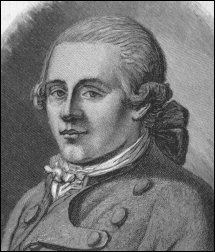The Influence of J.M.R. Lenz’s The Soldiers on Brecht’s Mother Courage and Her Children
[This is the fourth part of a series. Please scroll down to read the first three installments.]
Source Materials/Subject
The relationship of The Soldiers and Mother Courage sheds interesting light on Brecht’s practice of creative borrowing. The sources and settings of the two plays are very different, but they converge through their insights into human behavior. In addition, their opening gambits establish a social dynamic that draws them together from contrasting origins.
The Soldiers is set in Flanders in the 1770s, over a three-year period in Lenz’s own time. Much of the soldier interaction in the play seems inspired by his uneasy affiliation with the Kleist brothers, especially in Strasbourg where Cleophe Fibich the goldsmith’s daughter lived as well. The publication of his semi-autobiographical Tagebuch in 1877 confirmed the author’s assertion that the Marie Wesener/Officer Desportes aspect of the play is based on a true incident in which Lenz played a part. 1 After completing the play Lenz sent it to Johann Herder (1744-1803) with the statement “that it involved half my existence.”2 In a follow-up letter, he wrote:
It is in the strictest sense a true story, experienced and
prophesized in the innermost recesses of my soul. But, as
I hope, masked so that the original, who is no Herder, will
never recognize himself in it.3
Another letter reveals that Lenz had written the play, documentary-style, as the events of the romantic intrigue were unfolding and didn’t wait for “the true story” to conclude. He had already finished The Soldiers and sent it to Herder when Cleophe Fibich (Marie) was still awaiting the return of her betrothed, Friedrich Georg von Kleist, (Desportes). Lenz wrote, “Whether he does so or deceives her is in the lap of the gods.”4 If he didn’t return, then Lenz comments that the play could not be published soon enough in order to ruin the man or force him to honor his pledge. If he did return, then Lenz fretted that the publication of the play would destroy Cleophe’s good name and happiness. He made attempts to conceal his authorship, suggesting the pseudonym “Steenkirk of Amsterdam” to his publisher. He even tried to convince Klinger to accept responsibility for writing it.5 As Lenz discovered, fidelity to nature had its downside.
Brecht, by contrast, set Mother Courage and Her Children: A Chronicle of the Thirty Years War three centuries before his time, against a panorama of 17th century history. Another well-known drama of the same war is Schiller’s trilogy Wallenstein. Though Wallenstein may have influenced Brecht’s writing of Mother Courage, it is likely that, if anything, he was reacting against this German classic. Eric Bentley has written that Brecht at times seemed to think of himself as the Anti-Schiller, someone who opposed the depiction of the Thirty Years War in Wallenstein with his “antiheroic, anticlassical, antiromantic worm’s eye view” of the war in Mother Courage.6 Because of the choices Brecht and Schiller made regarding their chief protagonists—the first a canteen woman and the second a duke and commander in chief of the Imperial Forces—the plays diverge in all but the historical backdrop.
In the case of Mother Courage and Her Children not only is the heroine of “lowly origin,” so is almost all of the cast—with the exception of the General in Scene Two and Yvette’s ancient Colonel in Scene Three. Schiller’s play may have given Brecht the idea of segregating the lowly from the nobly born, rather than integrating characters from all classes through out the play, as in Shakespeare. The first section of the trilogy, Wallenstein’s Camp, involves commoners and soldiers on the war’s sidelines who do not appear in the second and third sections. The Piccolomini and Wallenstein’s Death detail the war politics of the nobility and the tragic demise of the title character. Relevant to the writing of Mother Courage, Wallenstein’s Camp features a canteen woman. In Scene Five, she is asked about the whereabouts of her husband.
CANTEEN WOMAN:
The villain! He played me a scoundrelly trick,
No words are too strong for the way he behaved,
He ran off with every penny I’d saved,
Left me with nothing but his brat!
BOY [comes running up to her]:
Mother, don’t talk of my dad like that!
FIRST TROOPER:
Another mouth for the Emperor to feed
If the army would keep alive, it must breed!7
This excerpt seems a shadowy prefiguration of Brecht’s play, specifically the opening scene when Courage accounts for the various missing fathers of her three children, while the Recruiter looks out for a war that has its own needs.



Recent Comments